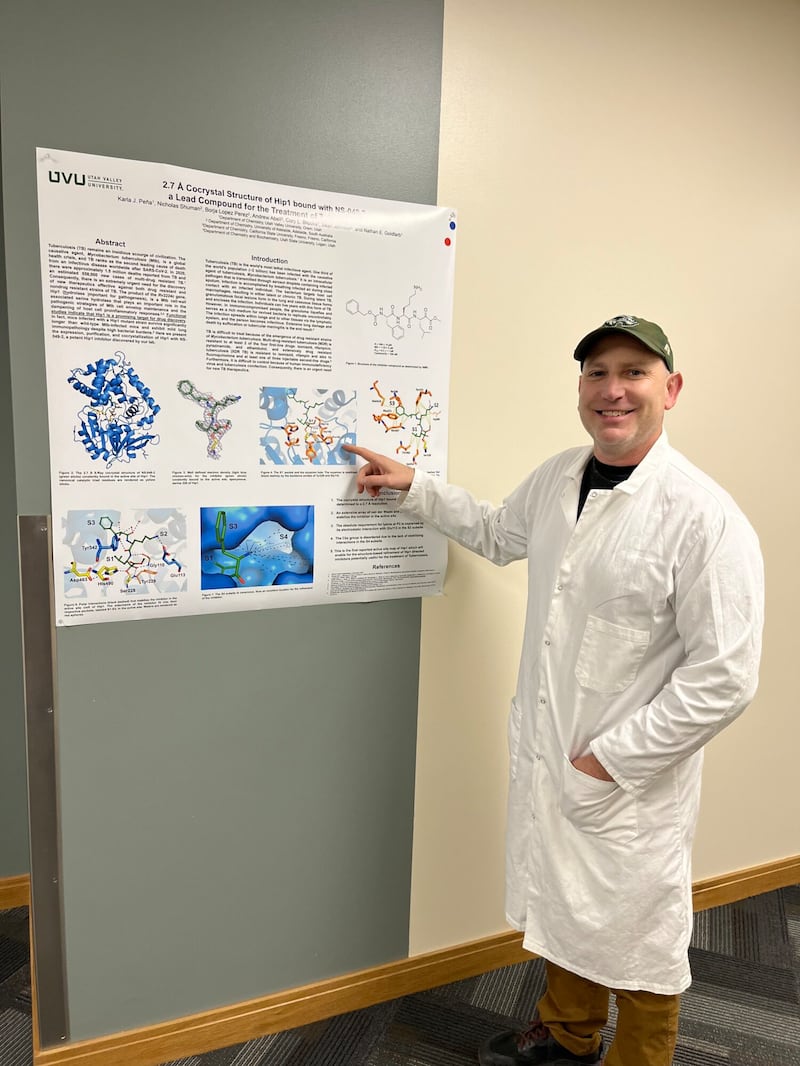Orem, UT—Nathan Goldfarb, Ph.D., assistant professor of chemistry at Utah Valley University (UVU), has received a utility patent pending and a continuation in part for two new molecules that could revolutionize the fight against Mycobacterium tuberculosis (Mtb).

The molecules, NS-049-2 and 0211-122, target and inhibit the Mtb pathogen. These inhibitors are crafted with a sequence designed to bind to an Mtb enzyme with a “warhead” that chemically destroys it. Goldfarb is working with researchers at the University of Adelaide in Australia and Johns Hopkins University in the United States to synthesize and test the new molecules.
Goldfarb’s unique approach has inhibited Mtb growth in cell culture experiments. Additionally, when they co-treated Mtb cells with these compounds and rifampicin, an FDA-approved antibiotic for tuberculosis treatment, there was a significant reduction in the amount of rifampicin required to kill the pathogen.
Goldfarb and his fellow researchers are optimistic that the new dual-compound drug will lower the dosage and time required to treat the infection, thus reducing side-effects, increasing patient compliance, and reducing antibiotic resistance. The current Mtb drug regimen requires patients to take medication daily for four months.
The new medicine will serve as a roadmap for refining and optimizing Mtb inhibitors in the future. It could also lead to the creation of rapid, Mtb tests, similar to the quick COVID-19 tests. Currently, sophisticated and expensive instrumentation, as well as trained personnel are required to detect Mtb through saliva and blood.
A rapid and easy test for Mtb is urgently needed in the global fight against the disease, which affects one-third of the world’s population and has a staggering annual mortality rate of 1.6 million deaths.
“I am passionate about teaching chemistry and developing solutions to diseases that harm so many people in the world,” said Goldfarb. “This new drug has the potential to dramatically reshape the way we treat Mtb and bring relief to millions around the globe.”
Goldfarb received his bachelor’s degree in biology from the Virginia Polytechnic Institute and State University and his master’s degree in molecular biology/biotechnology from East Carolina University. Following that, he earned his Ph.D. in biochemistry from the University of Florida.
After completing his education, Goldfarb accepted a postdoctoral position studying Alzheimer’s disease at the global pharmaceutical company, Schering-Plough. The company soon hired him as a senior scientist to work on the evolution of novel enzymes used in drug synthesis.
Realizing his true passion was academics, he returned to the University of Florida for a second postdoctoral position, where he published in the areas of HIV, malaria, and tuberculosis drug discovery. His first teaching appointment was at the California Health Sciences University in Clovis, California. After two years of teaching biochemistry, he moved to his current academic position at Utah Valley University.

About Utah Valley University
At Utah Valley University, we believe everyone deserves the transforming benefits of high-quality education — and it needs to be affordable, accessible, and flexible. With opportunities to earn everything from certificates to master’s degrees, our students succeed by gaining real-world experience and developing career-ready skills. We continue to invite people to come as they are — and leave ready and prepared to make a difference in the world.
For more information, visit UVU’s Newsroom website for fact sheets, maps, leadership bios, history, photos, b-roll, filming policies, and a list of interview-ready faculty experts at https://www.uvu.edu/newsroom/# or scan this QR code.
Contact
Scott Trotter
Senior Director of Communications
University Marketing and Communications
801.863.6807
